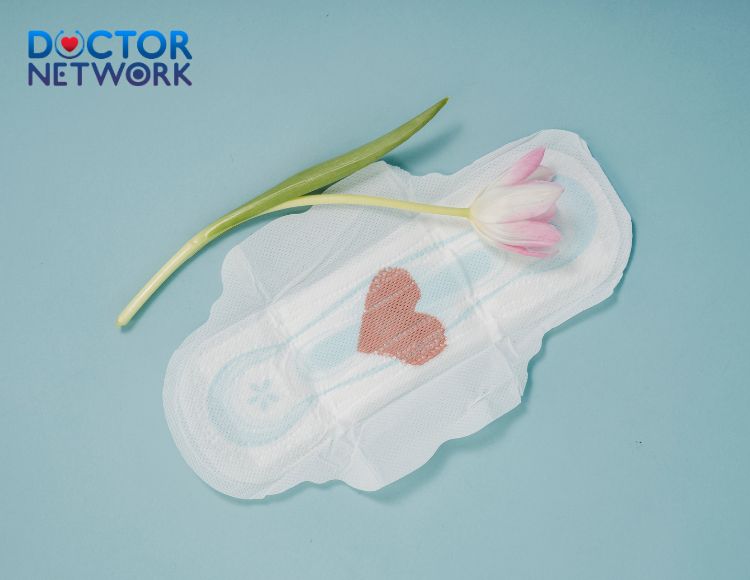Cervical cancer is a common type of cancer in women, caused by the abnormal growth of cells in the cervix. Early detection through recognizing the “early signs of cervical cancer” plays a crucial role in increasing the cure rate and improving quality of life.
Common Warning Signs Abnormal Vaginal Bleeding – The Most Important Sign
“Early signs of cervical cancer” – Bleeding after sexual intercourse
- Bleeding between menstrual periods
- Unusual bleeding after menopause
- “Early signs of cervical cancer” – Prolonged menstruation with heavier than normal flow
“Early signs of cervical cancer” – Abnormal vaginal bleeding
Abnormal Vaginal Discharge
- Vaginal discharge with a foul odor and abnormal color (yellow, brown, mixed with blood)
- Increased amount of discharge
Early Pelvic Pain
“Early signs of cervical cancer“ – A dull ache or heavy sensation in the lower abdomen, which may radiate to the groin
- Increased pain during sexual intercourse

“Early signs of cervical cancer” – Pelvic pain
Other Symptoms to Watch For Irregular Menstruation
Extremely long, short, or irregular menstrual cycles
- In addition to cancer, irregular menstruation can be caused by other factors such as hormonal imbalances, stress, etc.
“Early signs of cervical cancer” – Postmenopausal bleeding
- This is an abnormal sign that warns of the risk of cervical cancer or other health issues in postmenopausal women.

“Early signs of cervical cancer” – Irregular menstruation
Pap Test and HPV Testing Abnormal Pap Test
- Cervical cell testing helps detect abnormal changes before cancer develops.
- Women should regularly screen for cervical cancer with a Pap test.
HPV and Cancer
- Human Papillomavirus (HPV) is the main cause of cervical cancer.
- HPV testing helps assess the risk and prognosis of the disease.
When to See a Gynecologist
- When any of the early signs of cervical cancer mentioned above appear.
- If you have risk factors such as HPV infection, early sexual activity, multiple sexual partners, etc.
- Women aged 21 and older should have regular gynecological exams every 6 months to 1 year, even if there are no abnormalities.
Frequently Asked Questions About “Early Signs of Cervical Cancer”
Here are 5 common questions related to the “early signs of cervical cancer” along with their answers:
- Is abnormal bleeding definitely a sign of cervical cancer?
Answer: Abnormal vaginal bleeding is one of the “early signs of cervical cancer.” However, this condition can also be caused by other reasons such as infections, cervicitis, menstrual disorders, etc. Therefore, a gynecological examination is necessary for an accurate diagnosis.
- Can early-stage cervical cancer be cured?
Answer: Early detection of cervical cancer significantly increases the success rate of treatment. Treatment methods may include surgery, radiation therapy, and chemotherapy. Doctors will provide the most appropriate treatment plan based on the specific condition.
- Besides the “early signs of cervical cancer,” what else should I pay attention to?
Answer: Be aware of the risk factors for cervical cancer to proactively prevent it:
- HPV infection (can be prevented with the HPV vaccine)
- Early sexual activity, multiple sexual partners
- Smoking
- Weakened immune system
- Can the Pap test detect early-stage cervical cancer?
Answer: The Pap test is an effective screening tool to detect abnormal cells in the cervix, even in pre-cancerous or early cancer stages. Therefore, women should have regular Pap tests as recommended by their doctor.
- What should I do if I notice these signs?
Answer: Don’t panic. Schedule a gynecological examination as soon as you notice “early signs of cervical cancer” or other abnormalities. The doctor will conduct the necessary examinations and tests to provide an accurate diagnosis and timely treatment plan.
Scientific Evidence Related to “Early Signs of Cervical Cancer”
Here is some scientific evidence about the “early signs of cervical cancer“:
- Incidence and Mortality Rates:
- According to the World Health Organization (WHO), cervical cancer is the fourth most common cancer in women worldwide, with an estimated 604,000 new cases and 342,000 deaths in 2020.
- In Vietnam, cervical cancer is the leading gynecological cancer in terms of incidence and mortality in women. According to GLOBOCAN 2020, there are an estimated 16,225 new cases and 5,216 deaths annually from cervical cancer.
- Early detection of cervical cancer can improve survival rates up to 90%.
- Evidence of Symptoms:
- Abnormal vaginal bleeding: A study by the Centers for Disease Control and Prevention (CDC) found that abnormal vaginal bleeding after sexual intercourse is the most common symptom of early-stage cervical cancer, occurring in 65% of patients.
- Abnormal vaginal discharge: The American Cancer Society (ACS) reported that 30% of early-stage cervical cancer patients have vaginal discharge with a foul odor, unusual color, or increased amount.
- Early pelvic pain: According to a study published in the Journal of Cancer, 20% of early-stage cervical cancer patients experience a dull ache or heavy sensation in the lower abdomen.
- Effectiveness of Pap and HPV Testing:
- Pap test: Research by the National Cancer Institute (NCI) shows that Pap testing can reduce cervical cancer mortality rates by 85%.
- HPV test: A study in the New England Journal of Medicine (NEJM) found that combining HPV testing with the Pap test enhances accuracy in detecting early-stage cervical cancer and precancerous conditions.
- Importance of Early Detection:
- Research from the University of Oxford (UK) indicates that detecting early-stage cervical cancer reduces the risk of death by 50% compared to late-stage detection.
- According to the ACS, women aged 21 and older should regularly screen for cervical cancer with Pap and HPV tests.
Conclusion
Recognizing the early signs of cervical cancer is key to protecting women’s reproductive health. Don’t hesitate to have gynecological exams and necessary screening tests to intervene and treat the disease promptly.
References:
https://www.who.int/news-room/fact-sheets/detail/cervical-cancer
Kiểm Duyệt Nội Dung
More than 10 years of marketing communications experience in the medical and health field.
Successfully deployed marketing communication activities, content development and social networking channels for hospital partners, clinics, doctors and medical professionals across the country.
More than 6 years of experience in organizing and producing leading prestigious medical programs in Vietnam, in collaboration with Ho Chi Minh City Television (HTV). Typical programs include Nhật Ký Blouse Trắng, Bác Sĩ Nói Gì, Alo Bác Sĩ Nghe, Nhật Ký Hạnh Phúc, Vui Khỏe Cùng Con, Bác Sỹ Mẹ, v.v.
Comprehensive cooperation with hundreds of hospitals and clinics, thousands of doctors and medical experts to join hands in building a medical content and service platform on the Doctor Network application.


























